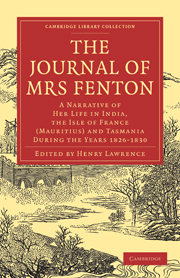 The Journal of Mrs Fenton
The Journal of Mrs Fenton II - FEBRUARY 1ST—APRIL 2ND, 1829
Published online by Cambridge University Press: 07 September 2011
Summary
2nd February.—‘Tomorrow’ has expanded into three days, but I may take up my story from it. Captain Patrick offered to drive me to Mr. Passmore's at dinner time, and leave Fenton the whole day uninterrupted. As we stepped into the boat Captain Patrick said, ‘My dear Mrs. Fenton, let me recommend you a bonnet. Although your hair and its arrangement is undeniably beautiful, it will be discomposed and you will take cold.’
‘A bonnet, my dear sir, where would I get a bonnet, unless you can lend me one? It is so long since that article has formed an item in my equipment for driving, I did not remember there was such a thing in the world.’
So finding the deficiency could not be remedied, off we went, and I felt the cool sea air blowing over me a luxury, while Captain Patrick was in distress for its consequences.
I could not help thinking Fenton's observation just, as we drove through the narrow ill-disposed streets. The houses in general low, dark, dirty and inconvenient—a medley of French, English, and Indian taste and contrivance.
Mrs. Passmore's mansion looked something like the little bungalows in the higher provinces in India, painted yellow, standing in a small compound, shaded with pretty trees.
The inside is covered with that gay French paper of figures and landscapes which in the days of my youth I thought so pretty in Guernsey; and I like it still, though here it is not considered fashionable, the most vulgar English pattern is preferred. Pictures always dispose me to reverie; I like a story on the walls.
- Type
- Chapter
- Information
- The Journal of Mrs FentonA Narrative of Her Life in India, the Isle of France (Mauritius) and Tasmania During the Years 1826–1830, pp. 280 - 307Publisher: Cambridge University PressPrint publication year: 2010First published in: 1901


